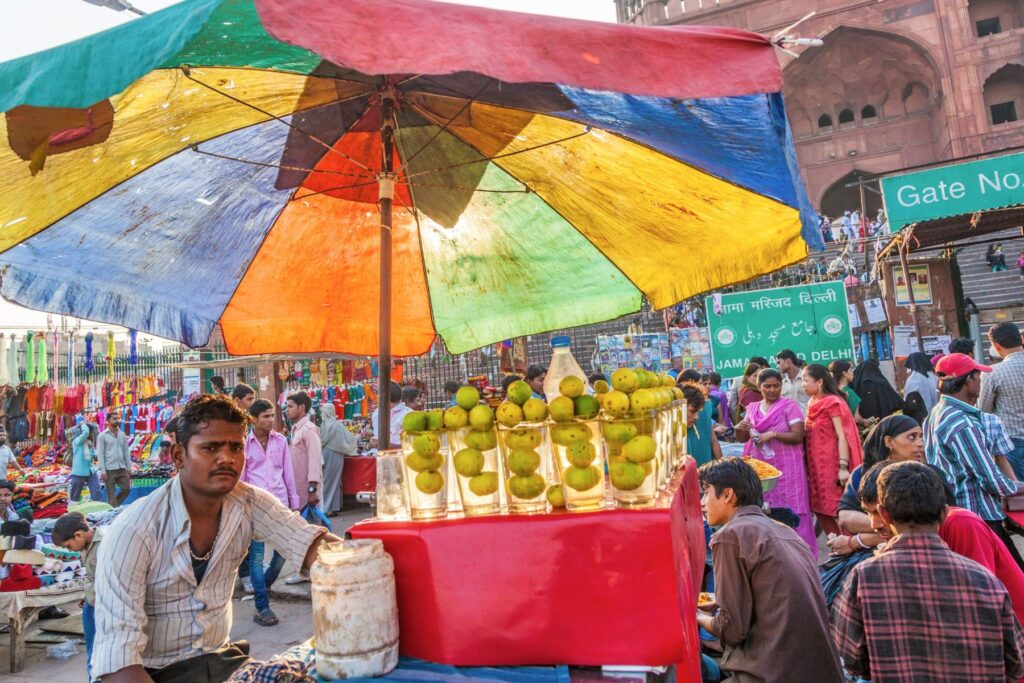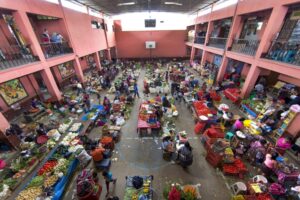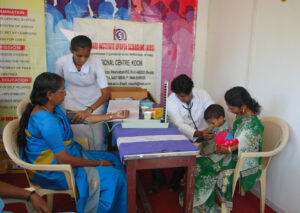Street Vendors Struggle With Rising Temps

A vendor sells cooling lemonade on a hot day at a street market outside the Jama Masjid mosque in Delhi (Image: Joerg Hackemann / Alamy)
When a person is exposed to extreme heat, their body increases blood flow to the skin as it desperately tries to cool down.
This attempt to cool creates more strain on internal organs and, if exposure is prolonged, serious organ failure is a possible outcome.
“The effects are particularly severe on the brain, although organs such as the heart and kidneys are where we have recorded chronic failures,” says Jonathan Lee, a researcher in environmental health who works on heat at Boston University in the United States.
Lee is one of a small number of scientists currently studying the effects of extreme and prolonged heat on an extremely vulnerable and often neglected group: those who work outdoors. These people have always been exposed to inclement weather but now, climate change is dramatically escalating the risks they face.
According to a report published in May, nearly half of the world’s population had suffered at least 30 days of extreme heat due to climate change in the previous 12 months. The report defines extreme heat as temperatures that are “hotter than 90% of temperatures observed in their local area over the 1991-2020 period”.
Many studies document the health problems that result from exposure to heat around the world, including immediate issues such as dehydration and heatstroke, and longer-term problems such as kidney failure. But there are few that address the issues faced specifically by those whose place of work is the streets, such as market traders or street vendors. This is according to Nash Tysmans, who works as Asia coordinator for Streetnet International, which brings together street vendors’ unions in 55 countries.
This lack of data and interpretation – especially in the Global South – makes it difficult to gauge the scale of the problem facing vendors, she says. Anecdotal reports suggest informal workers in general, and street vendors in particular, face growing pressure from heat.
“For them, climate change is already palpable. It exacerbates the precarious conditions in which they already worked. People are noticing the effects on their health and also on their income,” says Tysmans.
She led a field investigation with Oxfam that spoke with dozens of vendors in Cambodia, Vietnam and Laos. Some 77% of interviewees highlighted the risks that climate change poses to their health and their businesses.
Lee points out that personal protective equipment can be used to help workers cope with heat. This includes cooling vests, bandanas and fans. During extreme conditions, cities can declare “heat emergencies” and set up assistance centres where people can find cool refuge. Longer term solutions being studied around the world include the provision of shade in cities. Which solutions work best in which cities is an increasingly urgent question.
Disease, economic losses and emergency plans
While street vendors across much of Asia have long faced floods and storms that threaten their lives and businesses, heat has also become a chronic problem. The continent is warming almost twice as fast as the global average, according to the World Meteorological Organization.
As well as the health problems this brings, it can cripple street vendors’ income.
“When we talk to them, they mention economic losses first,” says Tysmans.
Fresh food rots faster in heat, driving up costs while lowering the prices many vendors can charge. High temperatures also drive away customers.
“People don’t go out during the hottest times of the day, which always coincide with the working hours of vendors. Many choose to open at night, but the flow of people is not the same,” says Tysmans.
According to the study coordinated by Tysmans, some vendors suffer a 30-40% drop in income during extreme-heat events. When you add in the extra costs of ice and water, the economic impact is even greater. And poverty adds to health problems, making it harder for people to eat healthily and seek medical treatment.
Vulnerability compounded by insecurity
One of the places hardest hit by extreme heat globally is India. In the city of New Delhi, 33.8 million people have to deal with temperatures that last year hit a record 49C.
Delhi has around 652,000 street vendors, of whom 94% of men and 46% of women report working more than 48 hours per week. That is according to research published last year by Women in Informal Employment: Globalizing & Organizing (Wiego).
During heatwaves, over half of the vendors experience headaches, dehydration, fatigue and cramps, according to a 2024 survey by Greenpeace and India’s National Hawker Federation.
Like many other densely populated cities, Delhi has drawn up emergency heat plans to try and deal with the problem. The 2024/25 action plan developed last year identifies street vending as among the most vulnerable sectors. It recommends more health centres, improved water supply and the promotion of night-time trading. But, again, a lack of data complicates action. There are no clear records of street vendors or their distribution, making it difficult to determine where to set up health centres or improve access to water.
Formalisation as solution
Jorge Peralta is the secretary general of Guatemala’s National Federation of Independent Workers and Vendors (Fentravig). He represents more than 125,000 vendors across the country.

“Last year, I went to a forum in Medellín that blew my mind,” he tells Dialogue Earth, referring to the forum of the General Union of Informal Workers, which is based in Colombia. The 2024 meeting featured a presentation on the effects of climate change on health. “There, I understood that climate change generates migration, that constant sun exposure increases the risk of skin cancer and affects the entire dynamic of our work.”
Guatemala City’s high altitude means temperatures of 30C are rare. But the union leader says the city has experienced heatwaves in recent years that can reach 33C, while elsewhere in the country temperatures of 40C have been recorded.
This creates problems for vendors concentrated in established markets. These structures are often aging and ill-prepared for heat or extreme storms. “The premises are old, and earthquakes and rain make them even more vulnerable,” says Peralta. “The roofs are made of sheet metal and burn everyone below [when it gets hot]. But street vendors are more vulnerable because they are more exposed.”
Peralta believes one major problem is that street vendors are informal workers, largely operating outside the usual systems of taxation, labour laws, contracts and controlled working conditions. For him, the formalisation of their employment is the first step on the road to adaptation. This means paying taxes, and having access to health insurance, electricity and water services, career progression and holidays.
Patrick Kane, Streetnet representative for Latin America, says street vendors suffer double victimisation: “Firstly, because they are excluded from the formal economic system and its benefits, but also because of the risks of climate change and the fact that they have no protection.”
In Guatemala and some other countries, trade unions are driving action to mitigate the heat, Kane says. The main measure associated with adaptation is formalisation of employment, but they are also proposing initiatives such as hydration points and environmental education. “In Uruguay and Brazil, there is also a lot of discussion about climate justice,” he adds.
Every five years, the countries of the Paris Agreement must update their climate action plans to show greater ambition. Current commitments made in these plans, known as Nationally Determined Contributions (NDCs), would only limit global warming to between 2.6C and 3.1C over the course of the century – far from the Paris targets of 1.5C or 2C.
Little mention is made of informal employment in many of the new plans published so far this year. The only country to include it as an issue in Latin America is Ecuador. Within its NDC, job losses and informal work are identified as part of the structural factors that affect society and make it more vulnerable. The NDC does not contain explicit policies to address the situation of street vendors.
One country where formality has proven advantageous for adaptation is Uruguay. Gabriela Calandria, leader of the Association of Special Market Vendors in Montevideo, tells Dialogue Earth that heat has brought several problems to street vendors, or feriantes, as they are called there.
“We have already recorded 15 cases of skin cancer, there are people who become dehydrated and there was even someone who suffered a heart attack,” she says.
But street vendors in Calandria’s country have several advantages over those in others: “Here, we are very included by the state. We are regulated by the local government. And we are not informal. We pay taxes, almost all of us.” They also have access to facilities such as covered market areas, medical insurance and pensions.
Calandria says this situation is unique: no other country in Latin America has these kinds of conditions. “Although the sun beats down on us, we are protected.”
(Published under Creative Commons from Dialogue Earth)





